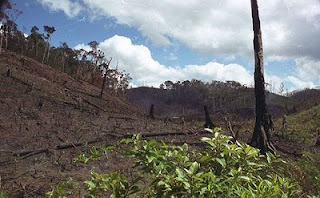
A
graphic published recently in
Le Monde reveals that companies from South Korea, China, Saudi Arabia, and the United Arab Emirates (UAE) are the top purchasers of foreign farmland. These corporations from water-strapped, land-starved, and/or densely populated countries often make bargain-basement deals with unsavory African and Asian governments—or even
warlords—to increase their own profits and their home nations’ food security.
A case in point: The International Criminal Court’s indictment of Sudanese President Omar al-Bashir for human-rights abuses has not deterred Saudi Arabia’s Hail Agricultural Development Co. from developing 9,200 hectares of land in Sudan or the UAE from investing in agricultural projects in several Sudanese provinces, including a 17,000-hectare farm for wheat and corn.
As previous New Security Beat posts have pointed out, allowing foreign governments to purchase land could threaten food security within the host country, and around the world. The heads of the Food and Agriculture Organization and the International Fund for Agricultural Development raised eyebrows last weekend when they suggested that these deals could be “win-win” situations, if done right.
These business ventures can also have serious political consequences: Several months ago, seeing an opportunity to capitalize on increasing population growth and limited arable land in its homeland, South Korean conglomerate Daewoo signed a deal to buy more than half of the arable land in Madagascar to grow grain and palm oil. Widespread anger at the terms of the deal—from which the island’s people would gain little—contributed to then-President Marc Ravalomanana’s unpopularity. After weeks of riots, Ravalomanana was ousted by Andry Rajoelina, who immediately axed the deal. “In the constitution, it is stipulated that Madagascar’s land is neither for sale nor for rent, so the agreement with Daewoo is cancelled,” Rajoelina told BBC News.
Yet although Rajoelina’s actions may seem to have preserved Madagascar’s land for its people, the coup he launched has spurred unprecedented destruction of this land, in the form of deforestation. The breakdown of authority that accompanied the coup spread into Madagascar’s protected areas, where groups of thugs have been illegally felling valuable trees at a rapid rate since the coup. This environmental destruction is particularly tragic for a country like Madagascar, which possesses some of the richest biodiversity on the planet and relies heavily on ecotourism for jobs and economic growth.
Next month, a Wilson Center event will explore some of the motivations, patterns, and implications of this rush for farmland. Five Wilson Center programs are co-sponsoring this event—demonstrating the global, cross-sectoral implications of this issue.
Photo: Deforestation in Madagascar. Courtesy of Flickr user World Resources Institute Staff and Jonathan Talbot.
 A graphic published recently in Le Monde reveals that companies from South Korea, China, Saudi Arabia, and the United Arab Emirates (UAE) are the top purchasers of foreign farmland. These corporations from water-strapped, land-starved, and/or densely populated countries often make bargain-basement deals with unsavory African and Asian governments—or even warlords—to increase their own profits and their home nations’ food security.
A graphic published recently in Le Monde reveals that companies from South Korea, China, Saudi Arabia, and the United Arab Emirates (UAE) are the top purchasers of foreign farmland. These corporations from water-strapped, land-starved, and/or densely populated countries often make bargain-basement deals with unsavory African and Asian governments—or even warlords—to increase their own profits and their home nations’ food security. A Publication of the Stimson Center.
A Publication of the Stimson Center.

 A
A 

